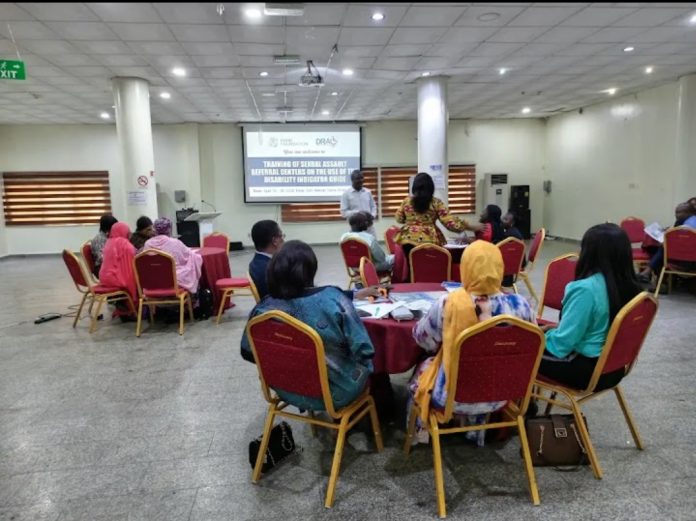In a bold push to amplify the voices of women and girls with disabilities, the Disability Rights Advocacy Center (DRAC) has called on media practitioners to prioritize the promotion of Sexual and Reproductive Health Rights (SRHR) for this marginalized group. The call was made during a breakfast meeting held on November 14, 2024, in Abuja, bringing together key media stakeholders to discuss ways to drive impactful advocacy through inclusive reporting.
Bridging the Gap in SRHR for Women with Disabilities
Dr. Irene Ojiugo Patrick-Ogbogu, the Executive Director of DRAC, set the tone for the meeting by highlighting the systemic challenges faced by persons with disabilities in accessing SRHR services. In her address, she revealed the existing barriers, ranging from societal attitudes and inaccessible healthcare facilities to inadequate policies and lack of information in accessible formats.
She emphasized the significance of the National Policy for Sexual and Reproductive Health Rights of Persons with Disabilities with Emphasis on Women and Girls, a framework developed in collaboration with the Federal Ministry of Health. “This policy, which has been in place for over five years, is due for review to assess its impact and identify gaps,” Dr. Patrick-Ogbogu said. “Enhancing its implementation will require collaborative efforts, particularly from the media.”
The Media’s Role in Advocacy
Dr. Patrick-Ogbogu underscored the media’s pivotal role in shaping public perceptions and narratives surrounding SRHR issues. “The media is a critical stakeholder,” she remarked. “How issues relating to SRHR for women and girls with disabilities are reported can influence societal attitudes and drive the change we need. There is a need for accurate, inclusive, and empathetic reporting to ensure that these challenges are brought to light effectively.”
She called on media practitioners to do more in highlighting SRHR issues, particularly those affecting women and girls with disabilities, urging them to be allies in advocating for accessible, inclusive healthcare services.
Empowering Media for Inclusive Advocacy
Balqis Bolaji Amoo, Programs Officer at DRAC, elaborated on the objectives of the meeting, stating that it was aimed at raising awareness and equipping the media with tools to foster advocacy on SRHR for Women and Girls with Disabilities (WGWD). “This is an opportunity to provide media practitioners with insights and resources to address these issues effectively in their reporting,” she explained.
Amoo emphasized that the media’s contribution is vital in empowering communities and shaping positive narratives. “By addressing SRHR challenges faced by WGWD—such as inaccessible health facilities, communication barriers, and attitudinal biases of healthcare providers—the media can play a transformative role,” she noted.
Challenges and Suggestions from Media Practitioners
The breakfast meeting also served as a platform for open dialogue between DRAC and media practitioners. Journalists from prominent media outlets such as Radio Nigeria, Wazobia FM, News 24, ONTV, NAN, The Qualitative Magazine, and Inclusion Magazine raised pertinent issues affecting their ability to report on SRHR for women and girls with disabilities.
Funding emerged as a significant barrier, with journalists urging DRAC to incorporate media practitioners into grant proposals. “This would enable us to undertake investigative journalism and deep-dive research into SRHR issues, ensuring more impactful reporting,” one participant suggested.
They also proposed simplifying SRHR messaging for media consumption. “Catchy and concise messages would resonate better with the public,” another participant remarked, recommending the use of hashtags and social media campaigns to amplify the advocacy.
However, challenges persist. Journalists noted the reluctance of some women with disabilities to come forward and share their SRHR experiences due to stigma and fear. This, they argued, limits the depth of stories they can report on, underscoring the need for a safe and supportive environment for these women to speak out.
Looking Ahead: A Call for Collaborative Action
The breakfast meeting concluded with a shared commitment to driving inclusive advocacy for SRHR. Participants agreed on the need for sustained collaboration between DRAC and the media to ensure that the voices of women and girls with disabilities are heard and their rights upheld.
Dr. Patrick-Ogbogu expressed optimism about the future, stating, “The media has the power to shift narratives and drive societal change. Together, we can dismantle the barriers hindering women and girls with disabilities from accessing the SRHR services they deserve.”
With a renewed focus on collaboration and innovative strategies for advocacy, this meeting marks a significant step towards fostering an inclusive society where the rights and health of all women, regardless of ability, are prioritized.


